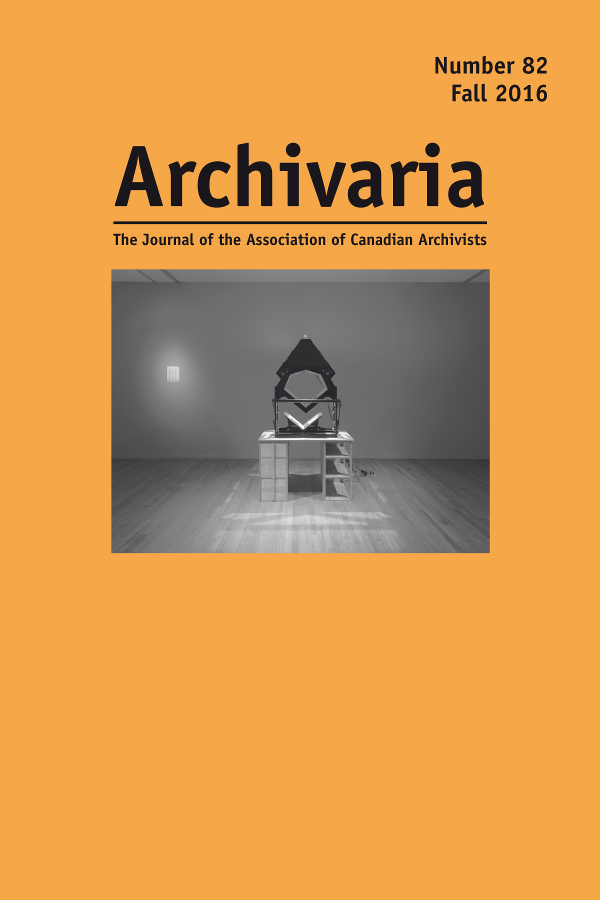From Missionaries to Managers: Making the Case for a Canadian Documentary Heritage Commission
Abstract
Recent events in the Canadian archival landscape suggest that the archival community is struggling to remain relevant in the digital age. While efforts have been made to articulate a new vision for the Canadian archival system, a fundamental weakness in the system is that it remains “closed,” without active participation from key stakeholders, particularly records creators and users. The Canadian Council of Archives and the very notion of the archival community are both premised on the assumption that the documentary heritage of Canada is a collective archival responsibility and therefore archivists can fulfill that responsibility through collaborative action. The digital revolution has demonstrated the weaknesses in this assumption. The strategic goal of the collective archival community now should be to foster a societal environment in which good records are created and valued. In order to achieve the ultimate goal of the Canadian archival system – to support the preservation of Canada’s documentary heritage – a new stakeholder-driven organization needs to be established, independent of archival institutions or the profession. Its purpose would be to promote, sustain, and expand Canada’s documentary heritage by emphasizing the importance of complete, authentic, and reliable records as tools to support the efficient functioning of contemporary society as well as central components of our documentary heritage. Driven by records creators and records users, this organization would fill a critical gap, opening up the Canadian archival system so that it includes inputs – both intellectual and financial – not only from archival institutions and archival professionals but also from the public, whose records we strive to preserve.
RÉSUMÉ
Des événements récents dans le paysage archivistique canadien suggèrent que la communauté archivistique ait beaucoup de mal à demeurer pertinente à l’ère numérique. Bien que des efforts aient été faits pour articuler une nouvelle vision pour le système archivistique canadien, une faiblesse fondamentale reste dans ce système : il demeure « fermé », sans participation active des intervenants clés, en particulier des créateurs de documents et des utilisateurs. Le Conseil canadien des archives et la notion même de la communauté archivistique partent tous les deux du principe que le patrimoine documentaire canadien est une responsabilité archivistique collective et que, par conséquent, les archivistes peuvent s’acquitter de cette responsabilité par l’entremise d’une action collaboratrice. La révolution numérique a exposé les failles de cette supposition. Le but stratégique de la communauté archivistique collective doit maintenant favoriser un environnement sociétal dans lequel de bons documents d’archives sont créés et valorisés. Afin d’arriver à rencontrer le but ultime du système archivistique canadien – d’appuyer la préservation du patrimoine documentaire du Canada – une nouvelle organisation menée par les intervenants doit être établie, indépendante des institutions d’archives ou de la profession. Son but serait de promouvoir, de soutenir et de faire accroître le patrimoine documentaire canadien en plaçant l’accent sur des documents d’archives complets, authentiques et fiables comme outils pour appuyer le bon fonctionnement de la société contemporaine et comme composantes essentielles de notre patrimoine documentaire. Poussée par les créateurs de documents et les utilisateurs des documents d’archives, cette organisation comblerait un vide, ouvrant ainsi le système archivistique canadien pour qu’il inclut l’apport, à la fois intellectuel et financier, non seulement des institutions archivistiques et des professionnels du milieu, mais aussi du public, qui crée les documents que nous aspirons à préserver.
Authors of manuscripts accepted for publication retain copyright in their work. They are required to sign the Agreement on Authors' Rights and Responsibilities that permits Archivaria to publish and disseminate the work in print and electronically. In the same agreement, authors are required to confirm that "the material submitted for publication in Archivaria, both in its paper and electronic versions, including reproductions of other works (e.g. photographs, maps, etc.) does not infringe upon any existing copyright." Authors of manuscripts accepted for publication retain copyright in their work and are able to publish their articles in institutional repositories or elsewhere as long as the piece is posted after its original appearance on archivaria.ca. Any reproduction within one year following the date of this agreement requires the permission of the General Editor.





